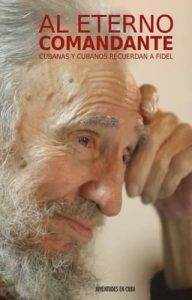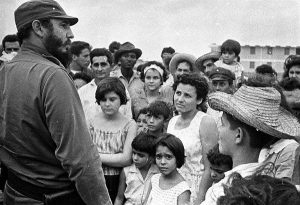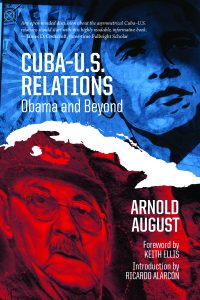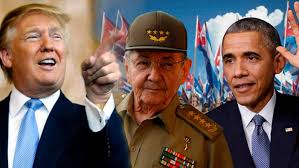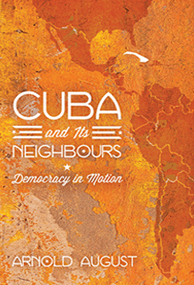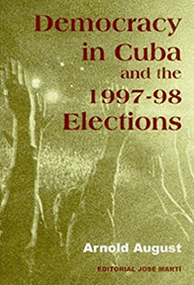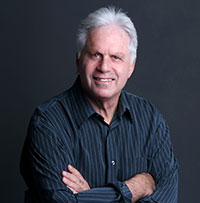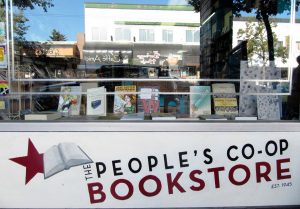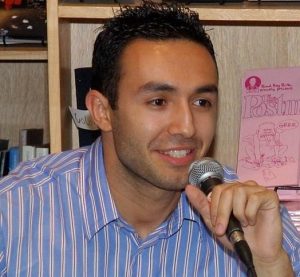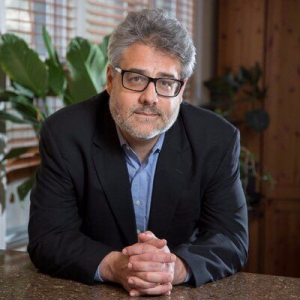La pelea Jim Acosta-Trump: Por qué soy “políticamente incorrecto”…. “Neutral.”
O cuando ambas partes son parte del imperialismo estadounidense.
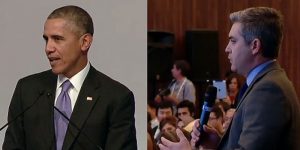
PeriodismoCuba
A continuación, se muestra un extracto de mi libro RELACIONES CUBA-ESTADOS UNIDOS, páginas 105-07. Por favor léelo. Como se cita a continuación en el extracto del libro, “Relaciones Cuba-Estados Unidos: ¿Qué ha cambiado?”, Jim Acosta nunca planteó el tema de los presos políticos en los Estados Unidos con Obama. Desde la era de Obama, Acosta nunca había desafiado y nunca lo plantea con Trump ahora.
Acosta ni siquiera se opone al hecho de que Trump esté tratando de traer a la fuerza al periodista Julian Assange de regreso a los Estados Unidos para que se enfrente a una corte de canguro y un castigo severo, algunos dicen que hasta la pena de muerte. No tengo ninguna simpatía de mi parte por Trump, por supuesto, pero ni siquiera por CNN English y su Acosta.
El CNN English – Trump diferendo es una pelea DENTRO DE LOS CÍRCULOS ELITES ESTADOUIDNSES de los cuales CNN English forma parte. Tanto CNN English / Acosta como Trump tienen dobles raseros inmorales cuando se trata de presos políticos. ¿Extremo? Uno tiene que enfrentar el hecho de que CNN English es parte de la política imperialista de los Estados Unidos, ya sea liderada por Obama o Trump. Por ejemplo, cuando Cuba obtuvo una gran victoria en la ONU EN EL ÚLTIMO VOTO PARA LEVANTAR EL BLOQUEO, el CNN English, tan “liberal”, ¡NO CUBRIÓ esto en absoluto!
¿Qué cubrieron sobre Cuba? Poco después de la votación en la ONU, el presidente Díaz-Canel llegó a Moscú y se reunió con el presidente Putin. ESTE SÍ fue reportado por la CNN English. ¿Pero cómo? Fue otro ataque contra Cuba por atreverse a desarrollar relaciones militares y de otro tipo con Rusia. Los titulares llamativos de la CNN English en la televisión (como se ve en las fotos en mi post aquí y que NO HAY NADA QUE VER CON LA VISITA DE DÍAZ-CANEL) fueron parte de la campaña anti-Rusia de la CNN English. Y así contra Cuba.
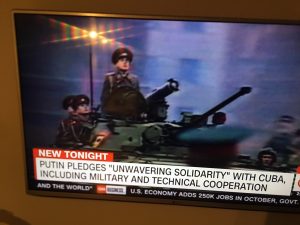
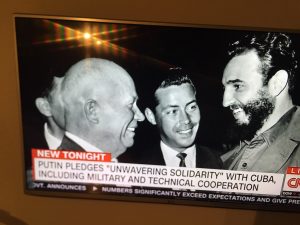
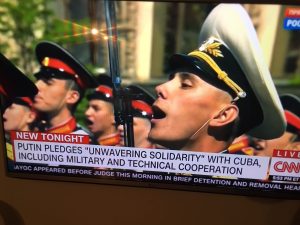
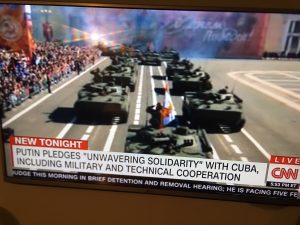
Lea esto a continuación y saca a sus propias conclusiones o únase al debate. ¿Me equivoco?
Del mi libro páginas 105-107:
“Obama en Cuba: ¿cómo los ‘prisioneros políticos’ se convirtieron en titulares en los medios?
“Durante la visita del presidente Obama a Cuba, el tema de los ‘prisioneros políticos’ ocupó el centro de las noticias sobre las relaciones Cuba- Estados Unidos en gran parte de los principales medios internacionales durante, al menos, 24 horas. Una letanía cacofónica acerca del tema emanaba de los reporteros en los sets; daba la impresión de que “Obama en Cuba” se había igualado a ‘prisioneros políticos’. La única excepción pareció ser Telesur, radicada en Caracas, Venezuela.
“¿Por qué pasó esto? En referencia a las discusiones con el gobierno cubano durante la conferencia de prensa conjunta de los presidentes Raúl Castro y Barack Obama el 21 de marzo, Obama afirmó:
‘Como hacemos en cualquier lugar adonde vamos en todo el mundo, dejé claro que Estados Unidos continuará defendiendo la democracia, incluido el derecho del pueblo cubano a decidir su propio futuro. Defenderemos los derechos humanos universales, incluida la libertad de palabra, de reunión y religión.’
“El tono de los comentarios del presidente estadounidense, enmarcados en un discurso diplomático, no era abiertamente hostil ni dirigía esas acusaciones hacia el gobierno cubano. No hubo mención de prisioneros políticos. Podría decirse, como el propio Obama afirmó, que se trataba del discurso esencial de los mandatarios estadounidenses en sus relaciones con algunos países. Sin embargo, la altanería de la Casa Blanca al dar lecciones a Cuba sobre democracia y derechos humanos, como muchos colegas cubanos consideran tal discurso justificadamente, se basa exclusivamente en los conceptos estadounidenses de la democracia y los derechos humanos. Con frecuencia van dirigidas a países del Tercer Mundo de manera arbitraria y con variaciones en énfasis y prioridades, en dependencia de la afinidad de estas naciones con la política exterior de Washington.
“Después de las presentaciones de los dos jefes de Estado, se dio la palabra al gran número de periodistas cubanos e internacionales. OBAMA RECONOCIÓ DE INMEDIATO AL AUTOR DE LA PRIMERA PREGUNTA: JIM ACOSTA, EL CORRESPONSAL PRINCIPAL DE LA CASA BLANCA PARA LA CNN. Tal como Acosta señaló en la introducción de su pregunta dirigida a Raúl Castro, él es un cubano-americano cuyos padres emigraron de la Isla. Tal preludio, al parecer, podía servir como credencial, a los ojos del periodista, para preguntar cualquier cosa, y le permitiría hacer la siguiente interrogante a pesar de su conocimiento prácticamente nulo sobre Cuba, circunscrito de hecho a las opiniones profundamente prejuiciadas de Estados Unidos.
“ACOSTA DEDICÓ SU PRIMERA PREGUNTA A BARACK OBAMA Y LUEGO SE DIRIGIÓ AL PRESIDENTE CUBANO:
‘MI PADRE ES CUBANO Y SE FUE A ESTADOS UNIDOS CUANDO ERA MUY JOVEN. ¿VE UNA DIRECCIÓN NUEVA Y DEMOCRÁTICA PARA SU PAÍS? ¿POR QUÉ TIENE PRISIONEROS POLÍTICOS CUBANOS Y POR QUÉ NO LOS SUELTA?’
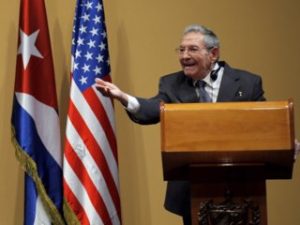
PeriodismoCuba
“La respuesta del presidente Castro fue la siguiente:
‘DAME LA LISTA AHORA MISMO de los presos políticos para soltarlos. Menciónala ahora. ¿Qué preso político? Dime el nombre, o los nombres, o cuando concluya la reunión me das una lista con los presos, y si hay esos presos políticos, antes de que llegue la noche van a estar sueltos’.
“La pregunta y su respuesta viajaron de inmediato alrededor del mundo convertidas en “noticia” de primera plana, centrada sobre todo en Estados Unidos en un rol protagónico dentro de Cuba.
“Obama no hizo mención de prisioneros políticos. Habría sido considerado tanto por la Casa Blanca como por el gobierno cubano una falta al protocolo y a las negociaciones e intercambio a puertas cerradas, lo cual es un rasgo positivo de las nuevas relaciones entre los dos países. DE MANERA CONVENIENTE PARA EL PRESIDENTE, el corresponsal principal de la CNN en la Casa Blanca abordó la cuestión en su lugar. EL LENGUAJE CORPORAL DE OBAMA Y SU EXPRESIÓN PARECÍAN INDICAR AGRADO ANTE LA PREGUNTA.
“¿Quiere esto decir que la Casa Blanca y Acosta se habían puesto de acuerdo? Obama y Acosta se conocen muy bien. El trabajo del corresponsal de la CNN no solo lo hace asistir con frecuencia a la Casa Blanca sino que, en ocasiones, acompaña al presidente en sus viajes. Teniendo en cuenta esta cercana relación, no hay necesidad de que se pongan de acuerdo explícitamente.
“Estos periodistas saben exactamente qué preguntar en las conferencias de prensa, y qué redactar y trasmitir a fin de no solo mantener sus puestos como corresponsales, sino también ascender hacia posicione más lucrativas y de mayor prestigio. Por ejemplo, SI ACOSTA LE HUBIERA PREGUNTADO ALGUNA VEZ AL PRESIDENTE DE ESTADOS UNIDOS —EN LAS INNUMERABLES CONFERENCIAS DE PRENSA EN LA CASA BLANCA EN RELACIÓN CON UNA ENORME VARIEDAD DE TEMAS— SOBRE LOS CENTENARES DE PRISIONEROS POLÍTICOS EN ESTADOS UNIDOS, ¿habría sido escogido siquiera para viajar a La Habana con Obama? Si Acosta hubiera tenido las agallas para cuestionar la práctica de los derechos humanos en Estados Unidos, nunca habría sido ‘seleccionado’ para su trabajo en primer lugar.”
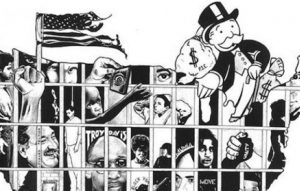
PeriodismoCuba
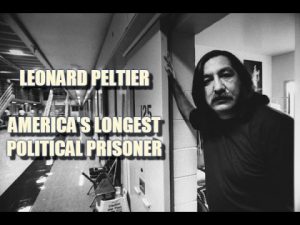
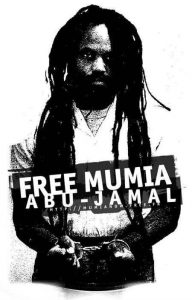
CNN INGLÉS Y LA VISITA DE JOHN KERRY A LA HABANA
(CNN English ¿Una Víctima)
En las paginas 107-8 en mi libro escribí sobre la visita del secretario de Estado, John Kerry, a La Habana el 14 de agosto de 2015, para la ceremonia de reapertura de la embajada de Washington en La Habana y la cobertura que Jake Tapper (CNN English), uno de los presentadores de más éxito en la CNN dio al evento:
“Casi todos los reportes consistieron en poco más que una letanía de frases para retratar a Cuba como una ‘dictadura’ y la ‘tiranía de los hermanos Castro.’ Tal enfoque fue, por supuesto, amplificado y reiterado en otros programas de la CNN English.”
PRISONEROS POLITICA EN EE. UU.
DOS DE LOS MÁS DE 357 PRISIONEROS POLÍTICAS EN LOS EE.UU.:
LEONARD PELTIER
En 1977 fue declarado culpable y condenado sin pruebas a dos cadenas perpetuas consecutivas por el supuesto asesinato de dos agentes del FBI que murieron durante un tiroteo en 1975 en la reserva india de Pine Ridge, en los territorios sagrados Sioux de Dakota del Sur donde se había encontrado meses antes uranio y carbón. En ese acoso al pueblo Lakota murieron asesinadas más de 250 personas de esta nación indígena, pero a día de hoy aún no se ha investigado ningún crimen cometido por los “ayudantes” de los agentes federales que realizaron el «trabajo sucio».
Ha habido mucho debate sobre la culpabilidad de Peltier y la imparcialidad de su juicio. Aún son inclasificables más de 10.000 folios con pruebas categóricas que absolverían de inmediato al condenado. Algunas organizaciones, entre ellas Amnistía Internacional, consideran que es un preso político. Esta organización dice que “aunque no ha sido confirmado como un preso de conciencia, existe la preocupación acerca de la imparcialidad de las actuaciones que conducen a su condena y se cree que factores políticos pueden haber influido en la manera en que el caso fue procesado”. Peltier está encarcelado en una cárcel estatal en Lewisburg, Pennsylvania.
MUMIA ABU-JAMAL
Nacido con el nombre de Wesley Cook, 24 de abril de 1954 es un periodista y activista político afroamericano estadounidense, condenado a pena de muerte en 1982 por el asesinato del oficial de policía Daniel Faulkner.
Involucrado en el nacionalismo negro en su juventud, fue miembro del Partido Pantera Negra hasta octubre de 1970, tras lo cual se convirtió en periodista de radio y fue presidente de la Philadelphia Association of Black Journalists. El 9 de diciembre de 1981, Faulkner recibió un balazo mortal en una parada rutinaria de tráfico al hermano de Abu-Jamal, William Cook. Se encontró a Abu-Jamal en la escena del crimen, con una herida de bala de la pistola de Faulkner, y su propio revólver descargado a su lado. Fue arrestado y acusado de crimen en primer grado.
Estuvo esperando ser ejecutado entre 1982 y diciembre de 2011, siempre declarándose inocente y tras una sucesión de todas las apelaciones posibles. En marzo de 2008, un tribunal ordenó revisar la condena a muerte y el 7 de diciembre de 2011 se conmutó su pena a cadena perpetua sin libertad condicional.
Mumia continuó realizando en prisión su programa de radio Live from Death Row, que fue también el título de su libro editado en 1995.
LISTA DE PRESOS POLÍTICOS EN ESTADOS UNIDOS
Por Néstor García Iturbe en Alainet.
16/10/2018
Hoy, gracias a dos organizaciones, la National Jericho Movement y la Social Movement Prisoners, publico las listas que nos enviaron, la cuales totalizan 157 prisioneros políticos.
Hemos solicitado a otras organizaciones sus listados, algunas como la de los Indios Nativos Encarcelados nos han planteado que su listado es confidencial y no pueden darlo, sin embargo por sus propios comunicados conocimos que existen 200 nativos, de origen indio en cárceles estadounidenses, en cuyas acusaciones se pone de manifiesto que los mismos fueron detenidos por luchar contra el sistema, por lo que son presos políticos. ESO HACE UN TOTAL DE 357 PRISIONEROS POLÍTICOS. Si a esto le sumamos los 166 de la cárcel de Guantánamo, hace un total de 523 presos políticos. UN RECORD MUNDIAL.
Sabemos que esta lista está incompleta, que aún quedan muchos casos que deben incluirse en la misma.
Si alguno de nuestros lectores conoce un caso determinado, o tiene vinculación con alguna de las organizaciones que sostienen esta lucha y pueden solicitarle que nos envíen su lista, con gusto la agregamos para que todos estemos mejor informados.
Si usted tiene posibilidad de enviar este artículo con las listas a cualquier otra persona, tanto en Cuba como en otro país, al igual que si puede remitirla a algún organismo internacional como la Organización de Naciones Unidas u otro, considero que ayudará a la divulgación de esta violación por parte de Estados Unidos de los derechos humanos y ciudadanos y del propio espíritu de su Constitución y leyes que establecen la libertad de pensamiento y expresión, lo cual la clase en el poder, el “establishment”, pisotea diariamente.
Lo prometido es deuda, la lista de Terroristas en Estados Unidos está en camino.
LISTADO DE PRESOS POLÍTICOS – NATIONAL JERICHO MOVEMENT • P.O. BOX 2164 • CHESTERFIELD, VIRGINIA 23832
Abdullah, Haki Malik (s/n Michael Green) # C-56123
PO Box 3456, Corcoran, CA 93212
Abu-Jamal, Mumia #AM 8335
SCI-Mahanoy, 301 Morea Rd., Frackville, PA 17932
Birthday: April 24, 1954
Acoli, Sundiata (Squire) #39794-066
FCI Cumberland, P.O. Box 1000, Cumberland, MD 21501
Birthday: January 14, 1937
Africa, Charles Simms #AM4975
SCI Retreat, 660 State Route 11, Hunlock Creek, PA 18621
Birthday: April 7, 1956
Africa, Debbie Sims #006307
451 Fullerton Ave, Cambridge Springs, PA 16403-1238
Birthday: August 4, 1956
Africa, Delbert Orr #AM4985
SCI Dallas Drawer K, Dallas, PA 18612
Birthday: April 7
Africa, Edward Goodman #AM4974
301 Morea Road, Frackville, PA 17932
Birthday: October 21, 1949
Africa, Janet Holloway #006308
451 Fullerton Ave, Cambridge Springs, PA 16403-1238
Birthday: April 13, 1951
Africa, Janine Phillips #006309
451 Fullerton Ave, Cambridge Springs, PA 16403-1238
Birthday: April 25, 1956
Africa, Michael Davis #AM4973
SCI Graterford, Box 244, Graterford, PA 19426-0244
Birthday: October 6, 1955
Africa, William Phillips #AM4984
SCI Dallas Drawer K, Dallas, PA 18612
Birthday: May 12, 1956
Al-Amin, Jamil Abdullah # 99974-555
USP Florence ADMAX, P.O. Box 8500, Florence, CO 81226
Birthday: October 4, 1943
Azania, Zolo #4969
Indiana State Prison, 1 Park Row, Michigan City, IN 46360
Birthday: December 12, 1954
Bell, Herman #79C0262
Great Meadow Correctional Facility
11739 State Route 22, P.O. Box 51, Comstock, NY 12821-0051
Birthday: January 14, 1948
Bomani Sababu, Kojo (Grailing Brown) #39384-066
USP McCreary, P.O. Box 3000, Pine Knot, KY 42635
Bottom, Anthony Jalil #77A4283
Attica Correctional Facility, P.O. Box 149, Attica NY 14011-0149
Birthday: October 18, 1951
Bowen, Joseph AM-4272,
1 Kelley Drive, Coal Township, PA 17866-1021
Birthday: January 15, 1948
Bowers, Veronza #35316-136
USP Atlanta, P.O. Box 150160, Atlanta, GA 30315
Birthday: February 4
Burton, Fred “Muhammad” AF 3896
SCI Somerset, 1590 Walters Mill Rd, Somerset, PA 15510
Birthday: December 15, 1946
Campa, Rubén #58733-004
(envelope addessed to Rubén Campa,
letter addressed to Fernando Gonzáles)
F.C.I. Safford, P.O. Box 9000, Safford, AZ 85548
Birthday: August 18, 1963
Chubbuck, Byron Shane (Oso Blanco) #07909-051
USP Florence – High, P.O. Box 7000, Florence, CO 81226
Birthday: February 26, 1967
Conway, Marshall Eddie #116469
Jessup Correctional Institution, P.O. Box 534, Jessup, MD 20794
Birthday: April 23, 1946
Dunne, Bill #10916-086
USP Pollock, P.O. Box 2099, Pollock, LA 71467
Birthday: August 3
Fitzgerald, Romaine “Chip” #B-27527
Kern Valley State Prison, A-5-110
P.O. Box 5101, Delano, California 93216
Birthday: April 11, 1949
Ford, Patrice Lumumba #96639-011
USP Pollock, P.O. Box 2099, Pollock, LA 71467
Gilbert, David #83A6158
Auburn Correctional Facility, P.O. Box 618, Auburn, NY 13021-0618
Birthday: October 6, 1944
González Claudio, Avelino #09873-000
FCI Ashland, P.O. Box 6001, Ashland, KY 41105
Gonzalez Claudio, Norberto #09864-000
Unit G Room 15 DWWDF
950 High St. Central Fall, RI 02863
Birthday: May 27, 1945
Hammond, Jeremy #18729-424
MCC New York, 150 Park Row, New York, NY 10007
Birthday: January 1985
Hayes, Robert Seth #74-A-2280
Sullivan Correctional Facility, P.O. Box 116, Fallsburg, NY 12733-0116
Birthday: October 15, 1948
Hernández, Alvaro Luna #255735
Hughes Unit, Rt. 2, Box 4400, Gatesville, TX 76597
Birthday: May 12, 1952
Hilton, Freddie (Kamau Sadiki) #0001150688
Augusta State Medical Prison, Bldg 23A-2
3001 Gordon Highway, Grovetown, GA 30813
Birthday: February 19
Hoover, Larry #86063-024
Florence ADMAX, P.O. Box 8500, Florence, CO 81226
Birthday: November 30, 1950
Ka’bah, Abdullah Malik (aka Jeff Fort) #92298-024
USP Florence ADMAX, P.O. Box 8500, Florence, CO 81226
Birthday: February 20, 1947
Kambui, Sekou (William Turk) #113058
(envelope addressed to William Turk, letter to Sekou)
Bibb County Correctional Facility Unit A1-25A
565 Bibb Lane, Brent, AL 35034
Birthday: September 6, 1948
Khabir, Maumin (aka Melvin Mayes) #09891-000
MCFP Springfield, P.O. Box 4000, Springfield, MO 65801
Birthday: September 15
Koti, Mohamman Geuka 80-A-0808
Mohawk Correctional Facility,
P.O. Box 8451, Rome, New York 13440-8451
Birthday: October 11, 1926
Laaman, Jaan Karl #10372-016
USP Tucson, P.O. Box 24550, Tucson, AZ 85734
Birthday: March 21, 1948
Lake, Richard Mafundi #079972
Donaldson CF, 100 Warrior Lane, Bessemer, AL 35023-7299
Birthday: March 1, 1940
Langa, Mondo We (David Rice) #27768,
Nebraska State Penitentiary, P.O. Box 2500, Lincoln, NE 68542
Birthday: May 21, 1947
Latine, Maliki Shakur # 81-A-4469
Clinton Correctional Facility, P.O. Box 2001, Dannemora, NY 12929
López Rivera, Oscar #87651-024
FCI Terre Haute, P.O. Box 33, Terre Haute, IN 47808
Birthday: January 6, 1943
Magee, Ruchell Cinque # A92051
Calif. State Prison D-5 #113
P.O. Box 4670, Los Angeles County, Lancaster, CA 93539
Birthday: March 17
Majid, Abdul (Anthony Laborde) #83-A-0483
Elmira Correctional Facility
PO Box 500, 1879 Davis St, Elmira, New York 14902-0500
Birthday: June 25, 1949
Manning, Thomas #10373-016
FMC Butner, P.O. Box 1600, Butner, NC 27509
Birthday: June 28, 1946
Mason, Marie Jeanette #04672-061
FMC Carswell, P.O. Box 27137, Fort Worth, TX 76127
Birthday: January 26, 1962
McDavid, Eric #16209-097
FCI Terminal Island, P.O. Box 3007, San Pedro, CA 90731
Birthday: October 7
Odinga, Sekou #09A3775
Clinton Correctional Facility, P.O. Box 2001, Dannemora, NY 12929
Birthday: June 17, 1944
Peltier, Leonard #89637-132
USP Coleman I, P.O. Box 1033, Coleman, Fl 33521
Birthday: September 12, 1944
Pinell, Hugo “Dahariki” # A88401
SHU D3-221, P.O. Box 7500, Crescent City, CA 95531-7500
Birthday: March 10, 1945
Poindexter, Ed # 27767
Nebraska State Penitentiary, P.O. Box 2500, Lincoln, NE 68542
Birthday: November 1, 1944
Powell, Reverend Joy #07G0632
Bedford Hills CF, P.O. Box 1000, Bedford Hills, NY 10507-2499
Rodríguez, Luis V. # C33000
Kern Valley State Prison (AD_SEG),
(B1-205), P.O. Box 5102, Delano, CA 93216
Shabazz Bey, Hanif (Beaumont Gereau)
Golden Grove Prison, RR1, P.O. Box 9955, Kingshill, St. Croix, V.I. 00850
Birthday: August 16, 1950
Shakur, Mutulu #83205-012
Federal Correctional Complex, P.O. Box 3900, Adelanto, CA 92301
Birthday: August 8, 1950
Shoats, Russell Maroon #AF-3855
SCI-Mahanoy, 301 Morea Rd., Frackville, PA 17932
Birthday: August 23, 1943
Tyler, Gary # 84156
Louisiana State Penitentiary, ASH-4, Angola LA 70712
Wallace, Herman #76759
Elayn Hunt Correctional Center, CCR-B-#6,
P.O. Box 174, St Gabriel LA 70776
Birthday: October 13, 1941
Watson, Gary #098990
Unit SHU17, Delaware Correctional Center,
1181 Paddock Road, Smyrna, DE 19977
Woodfox, Albert #72148
David Wade Correctional Center, N1A
670 Bell Hill Rd., Homer, LA 71040
Birthday: February 19, 1947
Anarchist Movement Prisoners
§ Mark Neiween (Migs) NATO Chicago 2012 Prisoner
§ Sebastian Senakiewicz NATO Chicago 2012 Prisoner
§ Miguel Balderos
§ Casey Brezik
§ Bill Dunne
§ Marie Mason
§ Matt Duran
§ Katherine Olejnik (KteeO)
§ Matthew “Maddy” Pfeiffer
•
The Cleveland 4
§ Brandon Baxter
§ Connor Stevens
§ Doug Wright
§ Joshua “Skelly” Stafford
NATO 3
§ Brent Betterly
§ Jared Chase
§ Brian Church
Tinley Park 5
Anti-War
§ Dr. Abdelhaleem Ashqar
§ Dr. Rafil Dhafir
§ Patrice Lumumba Ford
•
The Holy Land Five
§ Ghassan Elashi
§ Shukri Abu-Baker
§ Mufid Abdulqader
§ Abdulrahman Odeh
§ Mohammad El-Mezain
Anti-police
§ Christopher Monfort
§ Andrew Mickel
Black/New Afrikan Liberation
§ Mumia Abu-Jamal
§ Zolo Agona Azania
§ Veronza Bowers Jr.
§ Sundiata Acoli (C. Squire)
§ Jamil Abdullah Al-Amin
§ Joseph “Joe-Joe” Bowen
§ Fred “Muhammad” Burton
§ Marshall Eddie Conway
§ Romaine “Chip” Fitzgerald
§ Robert Seth Hayes
§ Freddie Hilton (Kamau Sadiki)
§ Larry Hoover
§ Sekou Kambui (W. Turk)
§ Richard Mafundi Lake
§ Maliki Latine
§ Ruchell Cinque Magee
§ Abdul Majid
§ Sekou Odinga
§ Reverend Joy Powell
§ Ronald Reed
§ Kojo Bomani Sababu
§ Dr. Mutulu Shakur
§ Russell Maroon Shoats
§ Gary Tyler
•
Angola Three
§ Herman Wallace
§ Albert Woodfox
§ Chuck Sims Africa
§ Debbie Sims Africa
§ Delbert Orr Africa
§ Edward Goodman Africa
§ Janet Holloway Africa
§ Janine Phillips Africa
§ Michael Davis Africa
§ William Phillips Africa
Nebraska 2
§ Ed Poindexter
§ Mondo We Langa (D. Rice)
New York 3
§ Herman Bell
§ Jalil Muntaqim
Green Scare/Earth Liberation
§ Eric McDavid
§ Michael Sykes
§ Steve Murphy
§ Justin Solondz
§ Fran Thompson
•
Indigenous Prisoners
§ Byron Shane “Oso Blanco” Chubbuck
§ John Graham
§ Leonard Peltier
§ Luis V. Rodriguez
Puerto Rican Prisoners of War
§ Avelino Gonzalez Claudio
§ Norberto Gonzalez Claudio
United Freedom Front
§ Jaan Karl Laaman
§ Thomas Manning
Other National Liberation
§ Lynne Stewart
§ David Gilbert
§ Alvaro Luna Hernandez
§ Hugo Pinell
§ Tsutomu Shirosaki
§ NC Almighty Latin Kings and Queens
Virgin Island 5
§ Abdul Azeez (Warren Ballentine)
§ Hanif Shabazz Bey (Beaumont Gereau)
§ Malik Smith
15 de octubre del 2018.
Fuente-
https://www.alainet.org/es/articulo/195950
NOAM CHOMSKY SOBRE LA PRENSA EN EE.UU.
¿LA “SELECCIÓN” NO SE HA APLICADO A JIM ACOSTA?
Extracto del mi libro, página 77:
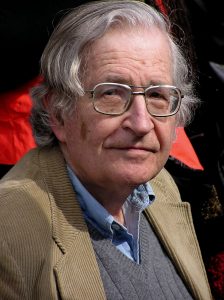
PeriodismoCuba
“Noam Chomsky reveló el papel de los medios en Estados Unidos como parte del orden establecido en su obra clásica Manufacturing Consent (Construyendo el consenso). Él y su coautor escribieron que ‘los medios sirven y hacen propaganda en favor de los poderosos intereses sociales que los controlan y los financian’. Chomsky sigue exponiendo los mecanismos internos de este fenómeno al indicar que las presiones ejercidas por los círculos de poder sobre los medios ‘no se llevan a cabo normalmente mediante la intervención directa, sino mediante LA SELECCIÓN DEL PERSONAL con la mentalidad adecuada y mediante la interiorización por parte de los periodistas y editores de las prioridades y definiciones de qué tiene valor como noticia, que constituyen la política institucional.”

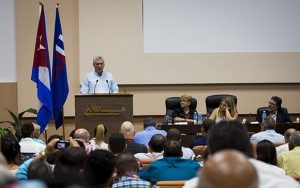
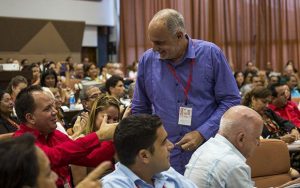
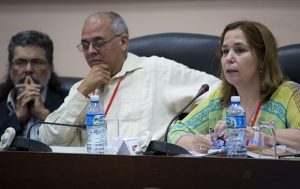
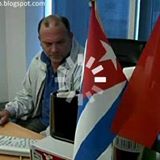
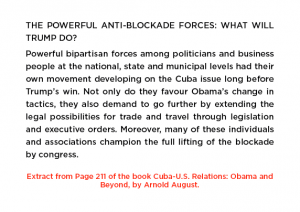
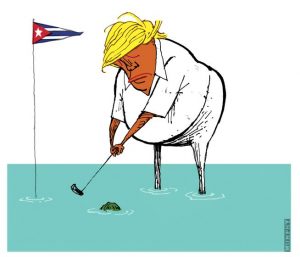
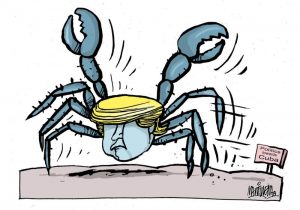
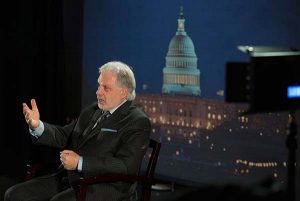
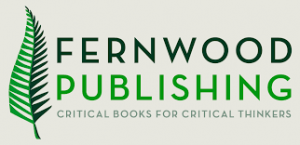



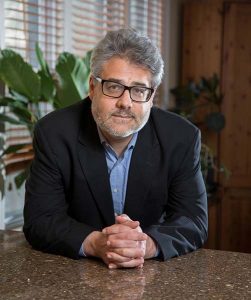
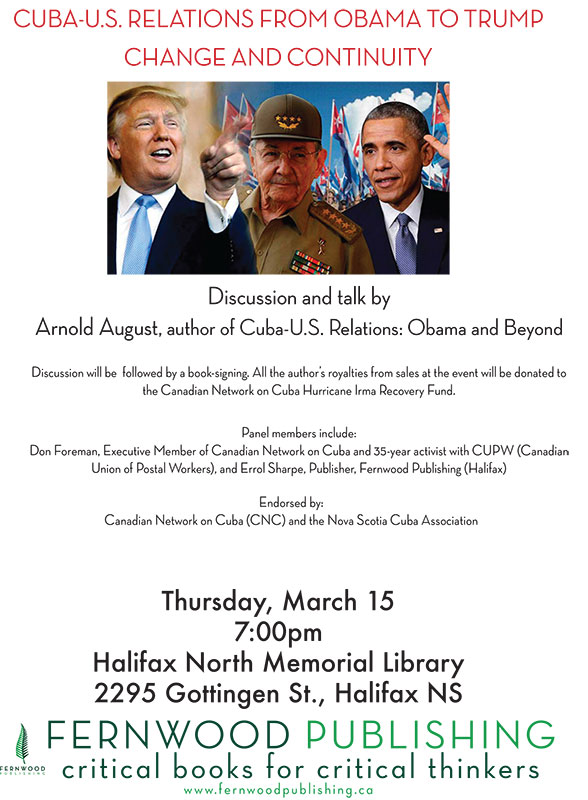
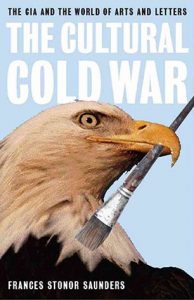
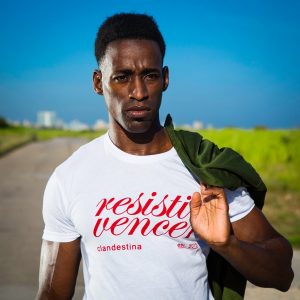
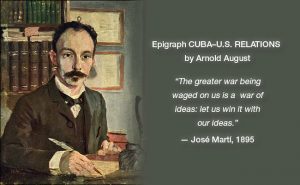 This example, among many others, confirms the well-documented thesis regarding the war on ideas (or cultural war) in my book CUBA–U.S. RELATIONS. This T-shirt business and its owner were explicitly promoted by Obama during his March 2016 visit to Havana. The owners graduated from the Columbia Business School’s Entrepreneurship and Competitiveness in Latin America Program.
This example, among many others, confirms the well-documented thesis regarding the war on ideas (or cultural war) in my book CUBA–U.S. RELATIONS. This T-shirt business and its owner were explicitly promoted by Obama during his March 2016 visit to Havana. The owners graduated from the Columbia Business School’s Entrepreneurship and Competitiveness in Latin America Program.